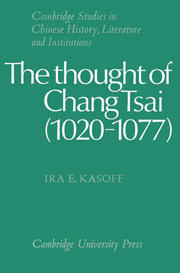Summary
This discussion has focused on Chang Tsai and on the relationship between his school and that of the Ch'eng brothers. These were not the only philosophic schools of the time: the eleventh century was a period of great diversity and there were several schools and intellectual alternatives, discussion of which is beyond the scope of this study. Indeed, as mentioned in Chapter 1, much of the activity during this period can be seen as an attempt to establish an orthodoxy, an ideology for the new sociopolitical elite. I will conclude by summarizing the history of the Tao hsüeh movement in its political context before it emerged as that orthodoxy in the thirteenth century. During this period political factionalism became intertwined with philosophic differences to a degree unprecedented in Chinese history.
Wang An-shih became chief minister in 1069 and began to institute major political reforms. He also used his political power to try to institutionalize his philosophy. He told the emperor, ‘Today human talent is lacking, and furthermore learning is not unified and heterodox doctrines swirl all around; the reason is that we are unable to unify morality. If we want to unify morality we must [reform] the schools, and if we want to reform the schools then the examination system must be changed.’ In 1075, Wang's New Commentaries on the Three Classics were established as the standard texts for the civil-service examinations and the schools. Many leading literati opposed Wang's policies and were removed from office, and from this time on factionalism increased in scope and intensity.
- Type
- Chapter
- Information
- The Thought of Chang Tsai (1020–1077) , pp. 148 - 153Publisher: Cambridge University PressPrint publication year: 1984



